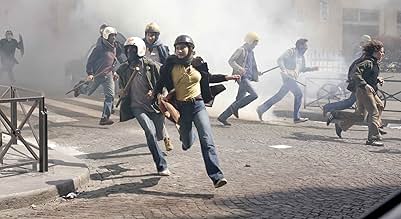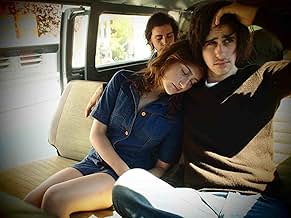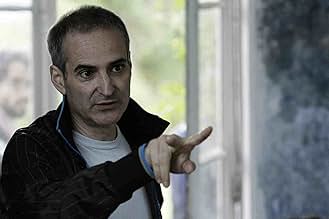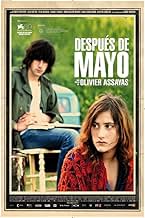CALIFICACIÓN DE IMDb
6.4/10
4.8 k
TU CALIFICACIÓN
En los meses posteriores a las vertiginosas semanas de mayo del 68, un grupo de jóvenes europeos busca una manera de continuar la revolución que se creía que acababa de comenzar.En los meses posteriores a las vertiginosas semanas de mayo del 68, un grupo de jóvenes europeos busca una manera de continuar la revolución que se creía que acababa de comenzar.En los meses posteriores a las vertiginosas semanas de mayo del 68, un grupo de jóvenes europeos busca una manera de continuar la revolución que se creía que acababa de comenzar.
- Premios
- 5 premios ganados y 4 nominaciones en total
Felix Armand
- Alain
- (as Félix Armand)
Bobbi Salvör Menuez
- Leslie
- (as India Salvor Menuez)
- Dirección
- Guionista
- Todo el elenco y el equipo
- Producción, taquilla y más en IMDbPro
Opiniones destacadas
It's a fascinating period, late 60s France from the perspective of the student movement.
The violence of the police, the underground press, the graffiti, protests, the connection and disagreements with the other socialist groups, the independent cinema collectives.
With the backdrop of the music and art of that era.
What this film is really about though is wanting to support a cause but also trying to decide upon your own future. I think they pull this off well by following the characters individually rather than just when they are a group.
It's beautifully shot and in some very picturesque locations.
I think it is a very good film.
The violence of the police, the underground press, the graffiti, protests, the connection and disagreements with the other socialist groups, the independent cinema collectives.
With the backdrop of the music and art of that era.
What this film is really about though is wanting to support a cause but also trying to decide upon your own future. I think they pull this off well by following the characters individually rather than just when they are a group.
It's beautifully shot and in some very picturesque locations.
I think it is a very good film.
In 1968 in Paris, France, the something in the air was revolution. In March of that year, a single spark began a revolt when a small group of students at Nanterre University took to the streets to protest conditions at the University. By July, workers had shut down Paris with a general strike in which ten million workers took part, occupying factories and marching in solidarity with students, who occupied the Sorbonne. The objectives were self-management by workers, a decentralization of economic and political power and participatory democracy in the factories and universities. By the end of July, the government of the autocratic Charles de Gaulle was teetering on the brink of collapse.
The impact of the 1968 near revolution is still being felt three years later in February, 1971 when Olivier Assayas' semi-autobiographical Something in the Air opens. A demonstration is held at the Place de Clichy in Paris as a teacher in a high school class reads a passage from Pascal, "Between us and Heaven or Hell there is only life, which is the frailest thing in the world." At the same time, the brutal police repression of a young protester, Richard Deshayes, takes place in nearby streets demonstrating the immediacy of Pascal's words. Deshaves loses an eye after being hit in the face by a smoke grenade, and the poster of his bloody head is shown as a symbol of resistance throughout the film.
Something in the Air is about coming-of-age and the awakening of conscience, and Assayas has the courage to remind us of the need to align our actions in life with our beliefs and conscience. Events are shown from the perspective of Gilles (Clément Métayer), a 17-year-old high school student who is a prospective filmmaker, painter of considerable talent as well as a political activist. Gilles and his friends Alain (Felix Armand) and Jean-Pierre (Hugo Conzelmann) are activists in the political arena, working to create a better society. They distribute leaflets, contribute articles to left-wing magazines, and spray paint graffiti slogans on the walls. After a security guard is seriously injured by a Molotov cocktail thrown by one of the protesters, however, Gilles and his new girlfriend Christine (Lola Creton) leave the country for Italy.
On the trip with a group of activist filmmakers, Gilles is told that he can only borrow a camera only if he does agitprop because "we don't do fiction." At a showing of a revolutionary film, a discussion follows about whether to use conventional style or "revolutionary syntax" to get their message across. Although the film is about ideas, we never know exactly which of the student activists are Anarchists, Trotskyites, Maoists, Marxists, Stalinists, or democratic Socialists, but it hardly seems to matter. What makes the film so unique is not only a script that is highly literate but its portrayal of young people with respect for their minds and an appreciation of their dignity and commitment, attributes normally not seen in films about the counterculture. Author Anne Morris said, "The irony of commitment is that it's deeply liberating – in work, in play, in love."
Assayas correctly notes that, in addition to advocating political and economic change, the protesters also want to change outmoded social conventions, particularly the stranglehold of the scientific/materialist paradigm and the puritan sexual mores that place barriers on spiritual growth and full self-expression. What comes across as special, even more than ideas about filmmaking or political theory, are the relationships they have with each other that express their openness and love. The film also blends idealism with music in a way that the songs of Syd Barrett-era, Booker T & the MG's, Nick Drake, and an inspiring rendition of a Phil Ochs song by Johnny Flynn feel organic to the scenes in which they are used.
When the students ultimately gain a sense that life is governed by practicality as well as idealism, they gradually drift away to parents, jobs, school and the careers that will shape their lives, but they have already made a difference. Though their immediate objectives were only partially met, later in the year, uprisings began in Poland and Czechoslovakia that would have a profound effect on the Soviet system, protesters marched at the Democratic Convention in Chicago, rioted at Kent State, and the brutal war against a small, peasant country came to an end several years later.
Though the film is more about personal goals and ambitions than revolution and Assayas does not shed much light on the causes that the students fought for, no film in recent memory has presented such an authentic view of the immediacy of the period as Something in the Air. The feeling of change is electric and its mood is brilliantly reflected by the film's lack of cynicism and condescension. Assayas brings us back to a time when everything seemed possible and people were truly young because the world, maybe for the first time, began to dream of what it would be like to be young with them.
The impact of the 1968 near revolution is still being felt three years later in February, 1971 when Olivier Assayas' semi-autobiographical Something in the Air opens. A demonstration is held at the Place de Clichy in Paris as a teacher in a high school class reads a passage from Pascal, "Between us and Heaven or Hell there is only life, which is the frailest thing in the world." At the same time, the brutal police repression of a young protester, Richard Deshayes, takes place in nearby streets demonstrating the immediacy of Pascal's words. Deshaves loses an eye after being hit in the face by a smoke grenade, and the poster of his bloody head is shown as a symbol of resistance throughout the film.
Something in the Air is about coming-of-age and the awakening of conscience, and Assayas has the courage to remind us of the need to align our actions in life with our beliefs and conscience. Events are shown from the perspective of Gilles (Clément Métayer), a 17-year-old high school student who is a prospective filmmaker, painter of considerable talent as well as a political activist. Gilles and his friends Alain (Felix Armand) and Jean-Pierre (Hugo Conzelmann) are activists in the political arena, working to create a better society. They distribute leaflets, contribute articles to left-wing magazines, and spray paint graffiti slogans on the walls. After a security guard is seriously injured by a Molotov cocktail thrown by one of the protesters, however, Gilles and his new girlfriend Christine (Lola Creton) leave the country for Italy.
On the trip with a group of activist filmmakers, Gilles is told that he can only borrow a camera only if he does agitprop because "we don't do fiction." At a showing of a revolutionary film, a discussion follows about whether to use conventional style or "revolutionary syntax" to get their message across. Although the film is about ideas, we never know exactly which of the student activists are Anarchists, Trotskyites, Maoists, Marxists, Stalinists, or democratic Socialists, but it hardly seems to matter. What makes the film so unique is not only a script that is highly literate but its portrayal of young people with respect for their minds and an appreciation of their dignity and commitment, attributes normally not seen in films about the counterculture. Author Anne Morris said, "The irony of commitment is that it's deeply liberating – in work, in play, in love."
Assayas correctly notes that, in addition to advocating political and economic change, the protesters also want to change outmoded social conventions, particularly the stranglehold of the scientific/materialist paradigm and the puritan sexual mores that place barriers on spiritual growth and full self-expression. What comes across as special, even more than ideas about filmmaking or political theory, are the relationships they have with each other that express their openness and love. The film also blends idealism with music in a way that the songs of Syd Barrett-era, Booker T & the MG's, Nick Drake, and an inspiring rendition of a Phil Ochs song by Johnny Flynn feel organic to the scenes in which they are used.
When the students ultimately gain a sense that life is governed by practicality as well as idealism, they gradually drift away to parents, jobs, school and the careers that will shape their lives, but they have already made a difference. Though their immediate objectives were only partially met, later in the year, uprisings began in Poland and Czechoslovakia that would have a profound effect on the Soviet system, protesters marched at the Democratic Convention in Chicago, rioted at Kent State, and the brutal war against a small, peasant country came to an end several years later.
Though the film is more about personal goals and ambitions than revolution and Assayas does not shed much light on the causes that the students fought for, no film in recent memory has presented such an authentic view of the immediacy of the period as Something in the Air. The feeling of change is electric and its mood is brilliantly reflected by the film's lack of cynicism and condescension. Assayas brings us back to a time when everything seemed possible and people were truly young because the world, maybe for the first time, began to dream of what it would be like to be young with them.
Gilles is an interesting character, a political activist studying to be an artist. But it's frustrating that beyond his political beliefs we get to know little about him. Conversations are short. What do any of the people feel? There are a lot of opinions and judgments made about society, authority, each other - usual for French films. But left me unsatisfied. Warning: Ironically, be prepared to meet many dissatisfied people, even majorly unhappy ones, during the course of this film. Wonderful evocation of times ('70s) and attention to detail though.
Almost 20 years later, Assays returns to his own adolescence, which he examined expertly in 1994's "Cold Water". As if to make it clear that he is coming full circle the main character (clearly based on Assayas himself), and one of the key supporting characters bear the same screen names as their counterparts in "Cold Water".
This grew on me considerably on 2nd viewing. Because I knew not to expect a straight- forward plot, but something much more episodic and tonal, I stopped focusing on the story, and took in all the details, and the mood. I found the film much funnier the second time, catching Assayas' gentle mocking of the over seriousness of these petite-bourgeois youth, at the same time that he captures the sad beauty in adolescence's naiveté and out sized passions.
"Something in the Air" focuses on politics, art and sex, taking place 3 years after the May 1968 riots, as the high school kids of that moment try to live in the spirit of revolution that was already starting to fade into factionalism (some of the film's best humor documents the absurdly intense rivalries between groups who mostly share common goals, and the insane parsing of every word and idea to examine if it was the 'right' thing to foment revolution).
There are some truly great sequences. An early scene of the kids battling the cops is exciting, raw and immersive. And there's a sequence at a party that's pretty breathtaking. Throughout, Assayas uses perfect music from the period, without using the same 6 songs every film about the late 60s/early 70s seem to fall back on. If the film isn't quite a masterpiece it is touching, funny and worthwhile work from one of the most interesting voices making films right now, one who can go from the near operatic "Carlos" to the quiet and intimate "Summer Hours", bringing each their own unique style. Assays is a true auteur, but he hasn't let that trap him into a single style or tone.
This grew on me considerably on 2nd viewing. Because I knew not to expect a straight- forward plot, but something much more episodic and tonal, I stopped focusing on the story, and took in all the details, and the mood. I found the film much funnier the second time, catching Assayas' gentle mocking of the over seriousness of these petite-bourgeois youth, at the same time that he captures the sad beauty in adolescence's naiveté and out sized passions.
"Something in the Air" focuses on politics, art and sex, taking place 3 years after the May 1968 riots, as the high school kids of that moment try to live in the spirit of revolution that was already starting to fade into factionalism (some of the film's best humor documents the absurdly intense rivalries between groups who mostly share common goals, and the insane parsing of every word and idea to examine if it was the 'right' thing to foment revolution).
There are some truly great sequences. An early scene of the kids battling the cops is exciting, raw and immersive. And there's a sequence at a party that's pretty breathtaking. Throughout, Assayas uses perfect music from the period, without using the same 6 songs every film about the late 60s/early 70s seem to fall back on. If the film isn't quite a masterpiece it is touching, funny and worthwhile work from one of the most interesting voices making films right now, one who can go from the near operatic "Carlos" to the quiet and intimate "Summer Hours", bringing each their own unique style. Assays is a true auteur, but he hasn't let that trap him into a single style or tone.
An experimental coming of age drama that has a good story to tell, but lacks a narrative. Director Olivier Assayas undoubtedly has talent (Carlos), but this film is definitely a misstep in his career.
"Apres Mai", french for after may. Set after the May 68 riots and their immediate aftermath. Students keep protesting and then partying, sometimes they're complaining about how unjust everything is for them and other times they're in Italy getting high.
It starts out good with fast paced editing, a moving soundtrack, great cinematography and a couple of rebel students that made me feel like it was going to be something similar to "Carlos". The movie lost its direction after the first 30 minutes or so and wandered onto other less interesting themes like the hippie culture.
I'd recommend it to people who liked movies similar to "Not Fade Away", "The Dreamers", or "Summer Hours".
"Apres Mai", french for after may. Set after the May 68 riots and their immediate aftermath. Students keep protesting and then partying, sometimes they're complaining about how unjust everything is for them and other times they're in Italy getting high.
It starts out good with fast paced editing, a moving soundtrack, great cinematography and a couple of rebel students that made me feel like it was going to be something similar to "Carlos". The movie lost its direction after the first 30 minutes or so and wandered onto other less interesting themes like the hippie culture.
I'd recommend it to people who liked movies similar to "Not Fade Away", "The Dreamers", or "Summer Hours".
¿Sabías que…?
- TriviaWith the exception of Lola Créton, the actors portraying the youths were inexperienced, mostly first-time actors found through director Olivier Assayas and casting director Antoinette Boulat having flyers handed out in front of high schools and having set up a casting Facebook page. They did audition other experienced young actors, but only Créton was selected.
- ConexionesFeatured in At the Movies: Venice Film Festival 2012 (2012)
Selecciones populares
Inicia sesión para calificar y agrega a la lista de videos para obtener recomendaciones personalizadas
- How long is Something in the Air?Con tecnología de Alexa
Detalles
- Fecha de lanzamiento
- País de origen
- Sitios oficiales
- Idiomas
- También se conoce como
- Something in the Air
- Locaciones de filmación
- Brunoy, Essonne, Francia(High School: Lycee Talma)
- Productoras
- Ver más créditos de la compañía en IMDbPro
Taquilla
- Presupuesto
- EUR 5,400,000 (estimado)
- Total en EE. UU. y Canadá
- USD 85,154
- Fin de semana de estreno en EE. UU. y Canadá
- USD 13,288
- 5 may 2013
- Total a nivel mundial
- USD 1,305,473
- Tiempo de ejecución2 horas 2 minutos
- Color
- Mezcla de sonido
- Relación de aspecto
- 1.85 : 1
Contribuir a esta página
Sugiere una edición o agrega el contenido que falta

Principales brechas de datos
By what name was Après mai (2012) officially released in India in English?
Responda

























